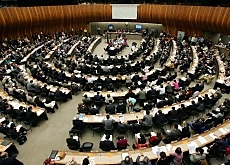Dreifuss refuses to give up the fight

Former Swiss cabinet minister Ruth Dreifuss speaks to swissinfo about her continuing struggle for justice and the fundamental importance of human rights.
The Social Democrat hopes the creation of the United Nations Human Rights Council, which will be based in her home city of Geneva, will afford better protection for victims.
Dreifuss, who was the first woman to hold the rotating Swiss presidency, left the cabinet in 2002.
She is president of the Commission on Intellectual Property Rights, Innovation and Public Health, an organ of the World Health Organization that helps poorer countries get access to patented drugs.
Dreifuss is also due to head a committee supporting nationwide votes against the new law on foreigners and the revised asylum law.
swissinfo: Human rights are a Swiss foreign policy priority but in Switzerland we are seeing tougher legislation against foreigners. Isn’t there a contradiction here?
Ruth Dreifuss: The hardening of the laws on foreigners and asylum risks violating Switzerland’s commitments to certain international treaties. There is a serious contradiction here that I will continue to do everything in my power to fight against.
But the issue is not so much whether there are contradictions but whether international safeguards are functioning properly in Switzerland. So far they are working, and sooner or later they end up influencing public debate in Switzerland.
In the domain of human rights, we can only make progress if we all work together. Debate on this issue must be open, even if it gives rise to opinions that go against Switzerland’s international commitments.
swissinfo: Can a country like Switzerland promote these universal values while at the same time defending its own interests?
R.D.: We discussed this often when I was in the cabinet. For a small country, it is especially important to defend international law.
There are in fact two ways to feel safe in this world: either a country tries to be the strongest – something even the United States has trouble with – or you create and develop international law. The smaller a nation is, the more interest it has in ensuring international law is respected.
swissinfo: In March 1999, when you were president, you had problems raising the issue of human rights in China with the country’s president, Jiang Zemin. How do you see the situation now?
R.D.: The more China becomes an enticing economic partner, the more important the internal stability of the country becomes for foreign investors. That’s the recent message given by several multinational investors present in China who worry about the destabilisation of the country due to a lack of respect for human rights.
As a result of its long-standing relations with China, Switzerland has been able to establish a formal dialogue on human rights with Beijing that has continued since the early 1990s.
The Swiss have made concrete proposals in areas such as prisons, justice and the role of lawyers.
As for Jiang Zemin’s visit, it was not so much the debate about human rights that annoyed him … rather the expression of these rights by pro-Tibetan demonstrators outside the parliament building during his visit.
swissinfo: The new Human Rights Council should favour dialogue over condemnation. That’s certainly Swiss Foreign Minister Micheline Calmy-Rey’s hope. Is this the right way forward?
R.D.: You have to single out offending countries and their victims. From my point of view, you have to work with countries where there are serious human rights abuses. And to help them resolve the situation, you have to show patience and perseverance.
But the victims of abuse cannot wait. Therefore at each instance you have to condemn violations and try to protect those who are suffering by questioning the governments concerned.
Interview: Carole Vann (InfoSud) and Frédéric Burnand (swissinfo)
Ruth Dreifuss was born in St Gallen on January 9, 1940.
From 1972-1981 she worked at the Swiss Agency for Development and Cooperation and the humanitarian aid office of the Swiss foreign ministry.
In 1981 she became secretary of the Swiss Federation of Trade Unions.
On March 10, 1993 she was elected to the Swiss cabinet. She was in charge of the interior ministry, which covers health, social welfare, culture and the environment, until she stepped down on December 31, 2002.
In 1999 she was the first woman to hold the rotating Swiss presidency.
The 62nd and final session of the Geneva-based UN Human Rights Commission ended on March 27. It will be replaced by the Human Rights Council.
On May 9 the UN General Assembly will elect the 47 members of the new body. Switzerland says it will apply for a seat.
The council will hold its first session in Geneva on June 19.

In compliance with the JTI standards
More: SWI swissinfo.ch certified by the Journalism Trust Initiative











You can find an overview of ongoing debates with our journalists here . Please join us!
If you want to start a conversation about a topic raised in this article or want to report factual errors, email us at english@swissinfo.ch.